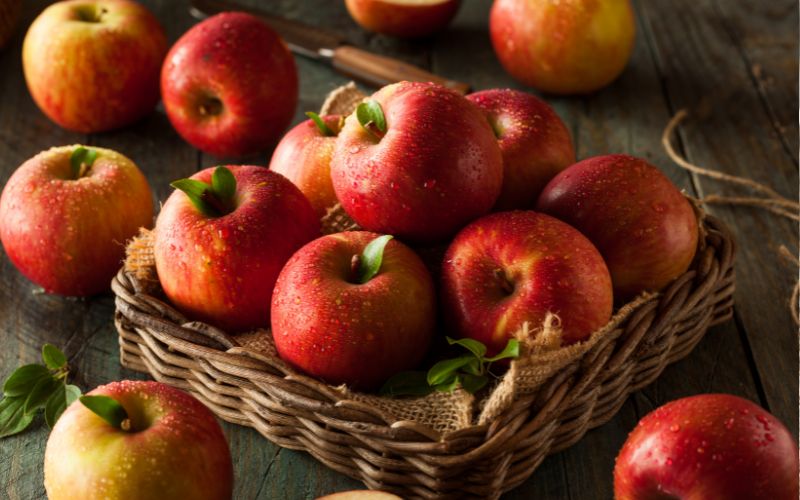Fuji apples are among the most popular varieties known for their crisp texture, sweet flavor, and vibrant color. In this blog post, we will explore the unique characteristics of Fuji apples, including their origin, taste profile, and storage tips. Whether you’re a fan of this delicious fruit or simply curious about its attributes, keep reading to discover everything you need to know about Fuji apples.
What is so special about the Fuji apple?
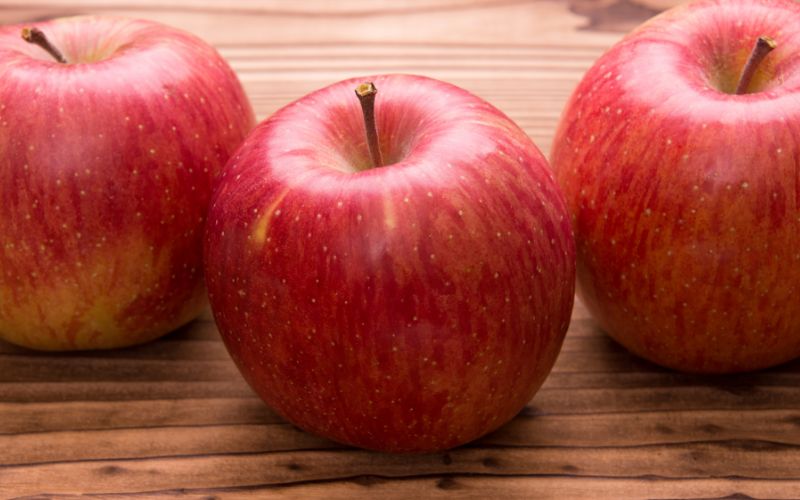
Fuji apples, known for their round shape, come in various sizes, ranging from large to very large. With an average diameter of 75 millimeters (3.0 in), they are visually appealing and satisfying to bite into.
These apples delight the taste buds, as they contain an impressive 9-11% sugar by weight. The dense flesh of Fuji apples sets them apart from other apple cultivars – it is both sweeter and crisper, providing a delightful crunch with every bite. It is no wonder that Fuji apples have gained popularity among consumers worldwide.
Why is it called Fuji apple?
Fuji apples are often mistakenly believed to be named after Mount Fuji. In reality, they derive their name from Fujisaki, a town in Japan where they were originally cultivated.
A large Fuji apple can provide approximately 15 percent of your recommended daily vitamin C intake. Additionally, Fujis are considered one of the top apple varieties for freezing.
Which country made the Fuji apple?
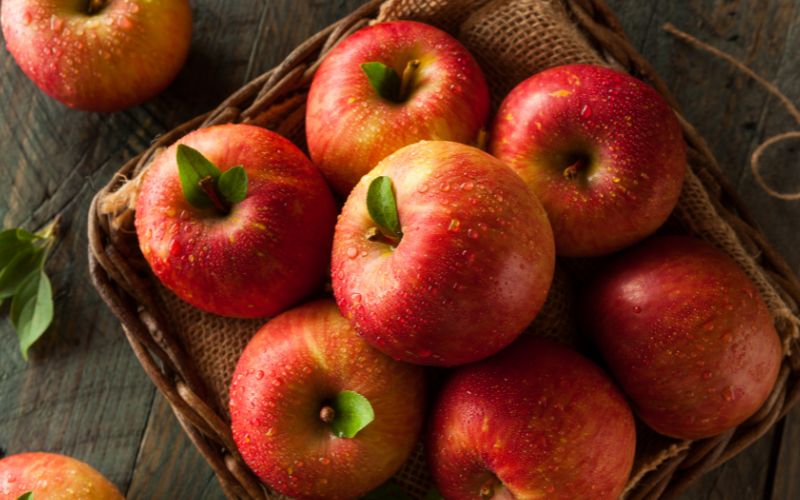
The Fuji apple, a delightful fruit, is a fascinating hybrid that originated in the beautiful country of Japan during the 1930s.
This apple variety was meticulously created by combining two exceptional American varieties: the Red Delicious and the old Virginia Ralls Genet.
The name “Fuji” was thoughtfully chosen to pay homage to the town near the research station where this remarkable fruit was first cultivated, Fujisaki.
What color is the Fuji apple?
Fuji apples, known for their distinct appearance, boast a vibrant light red skin adorned with a delicate yellow blush, occasionally accompanied by striking red stripes.
The flesh of these apples is characterized by its remarkable density, resulting in a tantalizingly crisp and juicy bite. Renowned for sweetness, Fuji apples offer a sensory treat with their luscious, creamy white hue.
Exhibiting a medium to large size, these apples truly capture attention with their irresistible allure.
What does Fuji apples taste like?
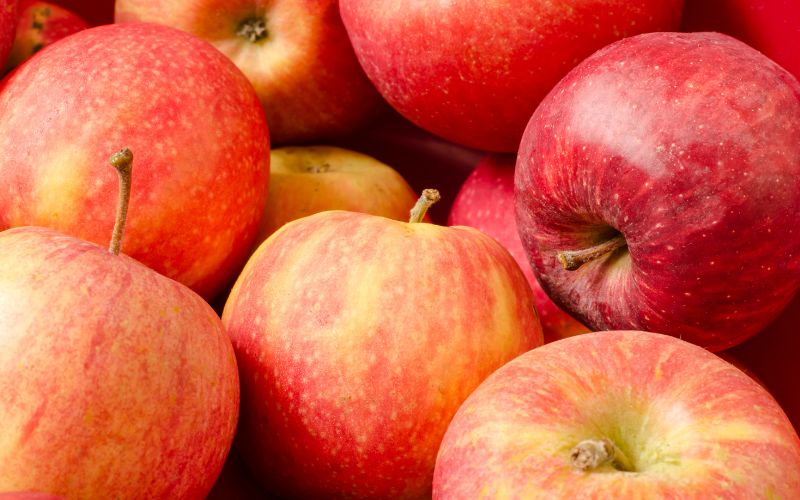
Taste & Appearance:
- Fuji apples have a sweet yet tart taste with a more citrusy flavor.
- Fuji apples tend to be larger and rounder compared to Gala apples.
- Fuji apples are also a deeper red in color compared to Gala apples.
Does the Fuji apple taste like a pear?
Did you know that the juice of the Fuji apple contains an impressive amount of sugar, reaching up to 18%? However, despite its sweet nature, the fruit manages to strike a perfect balance between its acidity and tartness, making it a delicious and safe option for even those who don’t have a strong affinity for sugary treats.
In fact, the flavor profiles attributed to this particular cultivar are pretty diverse, with some describing it as reminiscent of “honey,” others noting a hint of “citrus,” and some even comparing it to the delicate taste of a “pear.” With such a wide range of flavors, there’s no doubt that the Fuji apple is a versatile and enjoyable fruit for all.
Are Fuji apples crispy?
Fuji apples, with their delightful combination of ultra-sweetness, crispy texture, and juicy goodness, have become famous for snacking and baking.
Their low acidity makes them an ideal option for those who prefer a milder flavor. In addition to being a delicious snack on their own, Fuji apples also lend themselves beautifully to being transformed into homemade baby food or delectable apple kinds of butter.
Whether you are looking for a quick and healthy snack or a versatile ingredient for your culinary creations, Fuji apples will satisfy your taste buds and elevate your dishes to new heights.
Are Fuji apples soft to eat?
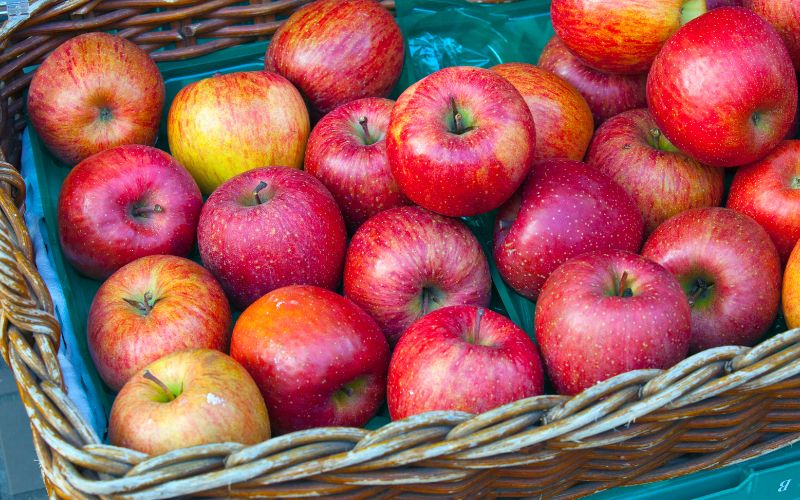
With their delightful and exquisite taste, Fuji apples possess a uniquely crisp texture that renders them ideal for slicing.
These apples lend a remarkable crunch that enhances the overall culinary experience when incorporated into salads or served as a side dish.
On the other hand, Gala apples showcase a thin outer skin and tender flesh, making them an excellent choice for imparting a tangy flavor to salads.
Unlike different varieties, Gala apples effortlessly avoid leaving behind any unwanted stringy skin, ensuring a seamless and enjoyable dining experience.
What makes Fuji apples different?
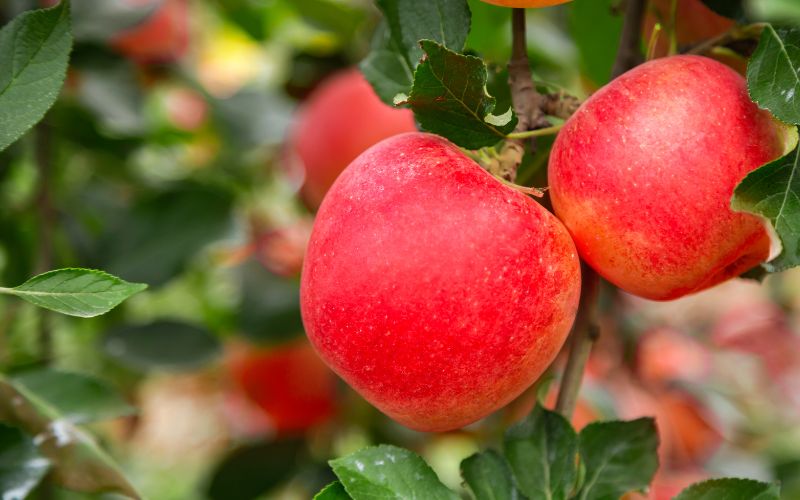
Ever since the Fuji apple made its way to the United States, it has experienced a remarkable surge in popularity, captivating the hearts of apple enthusiasts all over the country.
Renowned for its delectable sweetness, this apple boasts an impressive Brix (sugar) level ranging from 15 to 18 Brix, rendering it the epitome of sweetness among its peers.
Furthermore, its exceptional storage capabilities make it readily available in stores throughout the year, ensuring that apple lovers can enjoy its exquisite flavor anytime.
Which is sweeter, Fuji or Gala?
Fuji and Gala apples have three main differences:
- In terms of taste and appearance, Fujis are sweeter and more tart with a citrusy flavor, while Galas have a balanced sweet-tart taste and a mellow flavor. Fujis are also larger, rounder, and deeper red compared to Galas.
- Fujis are crisper and less dense in terms of texture and use in recipes, resulting in a firm and juicy bite, whereas Galas are softer and creamier. Fujis are better for baking as they hold their shape well when cooked.
- In availability, Galas are in peak season between May and September but are typically available year-round.
On the other hand, Fujis ripen later and peak between November and December in the Northern hemisphere and May to June in the Southern hemisphere.
| Fuji Apples | Gala Apples | |
|---|---|---|
| Origin | Fujisaka, Japan | New Zealand |
| Grown In | Cultivated in Fujisaki, Japan but found around the world | Can be found anywhere in the world |
| Size | 75mm | 55mm |
| Season | Fall and Winter (September-December) | Year-Round (fresher between May and September) |
| Taste | Citrusy, Tart | Sweet and Balanced |
| Texture | Firm and crisp, holds shape | Soft, creamy and dense |
| Color | Darker red | Lighter red |
| Uses | Can be used for cooking and baking, holds texture and shape | Can be eaten raw and used in salads due to its sweetness. |
Why are Fuji apples bitter?
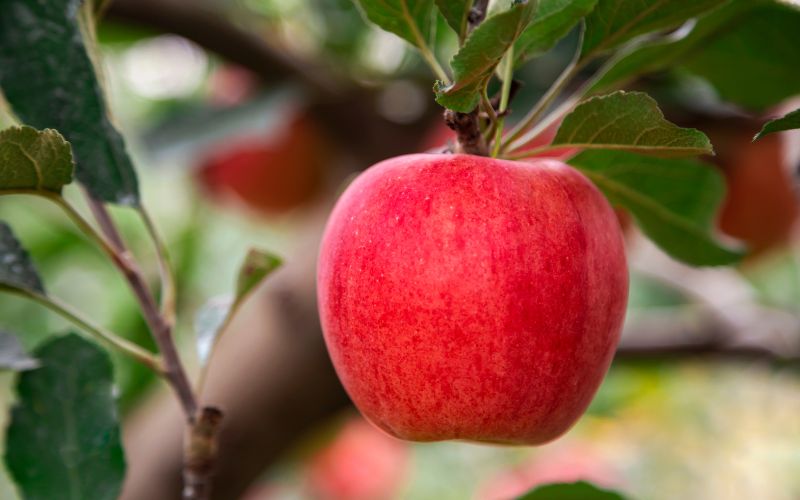
Multiple varieties of apples are available, each with unique characteristics and flavors. One distinguishing factor is the presence of tannin, which contributes to the acidic and bitter taste of certain apples.
Apples with low tannin content are typically enjoyed as a snack or in various culinary preparations. On the other hand, apples with a moderate tannin level are commonly used for cooking purposes, adding depth and complexity to dishes.
Finally, apples with a high tannin concentration are often used to produce cider and brandy, as their robust flavor profile lends itself well to these beverages.
Why are Fuji apples so expensive?
Fuji apples, known for their crisp texture and sweet flavor, require meticulous cultivation due to the delicate nature of the climate they prefer.
The temperamental conditions they thrive in challenge growers, resulting in a limited supply of these coveted apples. Consequently, the scarcity of Fuji apples compared to other apple varieties contributes to their higher price tag.
The additional costs associated with cultivating Fuji apples, from carefully monitoring the climate to ensuring optimal conditions, are reflected in their elevated production expenses.
Thus, combining a demanding environment and a smaller yield makes Fuji apples a premium fruit in both quality and price.
Fuji apple benefits
Are Fuji apples the healthiest?
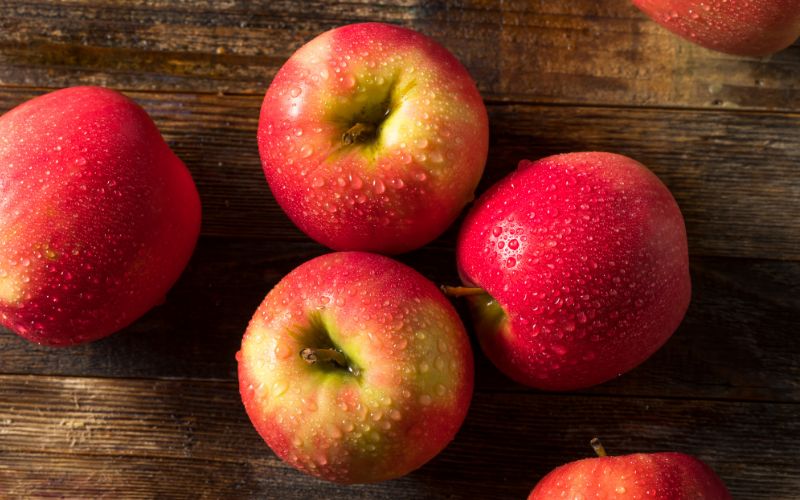
Fuji apples, known for their delightful sweetness and crisp texture, boast an impressive array of health benefits. These succulent fruits have been found to possess the highest overall concentration of bioflavonoids among all apple varieties.
Bioflavonoids play a crucial role in safeguarding our bodies against the development of heart disease and cancer, making them a vital component in maintaining optimal health.
Additionally, the consumption of Fuji apples can aid in weight management, as the bioflavonoids they contain help control weight by regulating various bodily processes.
Furthermore, these remarkable apples are a rich source of fiber, supporting healthy digestion and promoting heart health by reducing cholesterol levels.
Thus, incorporating Fuji apples into your diet can be a simple yet effective way to enhance your overall well-being.
What vitamin is in Fuji apple?
| Amount/Serving | %DV* | Amount/Serving | %DV* |
| Total Fat 0.3g | 0% | Tot. Carb. 21.3g | 16% |
| Sat. Fat 0g | 0% | Dietary Fiber 3.7g | 10% |
| Trans Fat 0g | Sugars 16g | ||
| Cholesterol 0mg | 0% | Protein 0.4g | |
| Sodium 1.5mg | 0% | ||
| Vitamin A – IU 3%Vitamin C 8%Calcium 1%Iron 1%Fat 0%Saturated Fat 0% | |||
Can a person with diabetes eat Fuji apples?
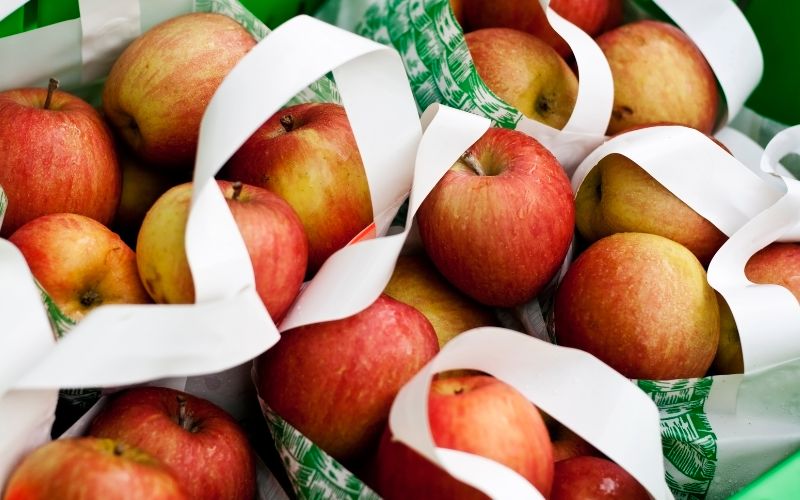
Fuji apples can be enjoyed by individuals with diabetes as part of a balanced diet. They have a moderate glycemic index (GI) score, meaning they have a slower impact on blood sugar levels than high GI foods.
However, it’s always advisable for individuals with diabetes to monitor their carbohydrate intake and consult a healthcare professional for personalized dietary guidance.
Are Fuji apples high in calories?
You can savor the delightful taste of Fuji apples in their pure, unadulterated form or incorporate them into a wide range of culinary creations such as crisp salads, tangy sauces, delectable desserts, and even savory dishes.
The versatility of these apples knows no bounds. Boasting a mere 100 calories per serving makes them a perfect addition to any balanced diet or weight loss regimen.
Nevertheless, should your stomach emit a growl of epic proportions, fear not! You can opt for a giant Fuji apple, which will satiate your hunger with its slightly higher caloric content of approximately 150 calories.
Are Fuji apples high in sugar?
Fuji apples, renowned for their exceptional sweetness, boast an impressive sugar content of approximately 16 to 18 grams.
This places them among the most delectably sweet apples known to humankind. Interestingly, a staggering 75% of the carbohydrates found in these succulent fruits can be attributed to their sugar content.
The remaining carbohydrates, however, derive from fiber’s invaluable presence, further enhancing these remarkable apples’ nutritional profile.
Are Fuji apples good for cholesterol?
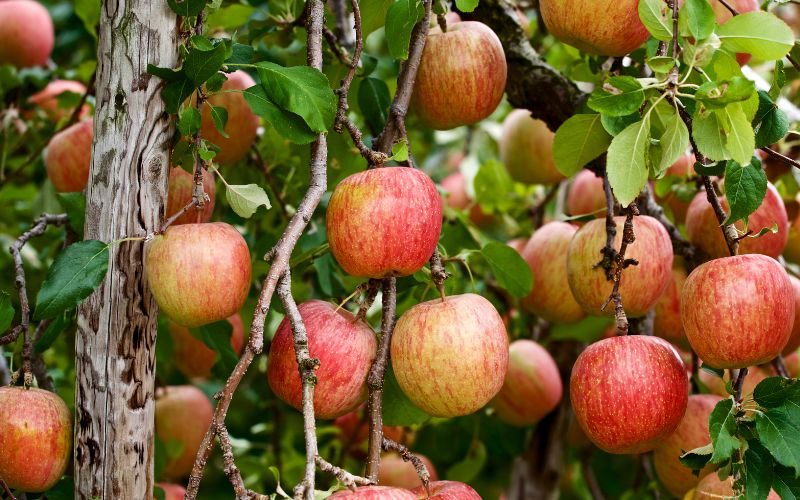
Apples, including Fuji apples, have been associated with potential cholesterol-lowering effects due to their high fiber content.
When incorporated into a balanced diet, the soluble fiber found in apples may help reduce LDL (harmful) cholesterol levels.
However, it’s important to note that individual dietary needs may vary, and it’s always advisable to consult with a healthcare professional for personalized nutritional recommendations.
Are Fuji apples high in acid?
When it comes to selecting apples, it’s essential to consider the varying acidity levels found in different apple cultivars.
Options such as Fuji, Gala, and Golden Delicious apples are highly recommended to cater to the preferences of those who prefer a sweeter taste or those who may have a sensitivity to acidic foods.
These particular apple varieties are known for their naturally sweeter flavor profile, thanks to their higher pH levels.
So, if you’re looking for an apple that is delicious and gentle on the taste buds, these sweeter apple kinds are worth considering.
Are Fuji apples good for constipation?
Apple juice has numerous benefits when it comes to digestion. One of its key advantages is its ability to soften stool and facilitate regular bowel movements.
This can be attributed to the high fiber content in apple varieties such as Gala, Fuji, or Granny Smith. By converting these apples into juice, the fiber acts as a natural laxative, helping to promote a healthy digestive system.
Are Fuji apples low-carb?
Fuji apples, known for their crisp texture and sweet flavor, are popular among fruit lovers. However, if you are following a keto diet, it’s essential to be mindful of the carb content in these apples.
A single medium-sized Fuji apple contains approximately 25.2 grams of net carbs, which can significantly impact your daily carb intake.
Therefore, it is advisable to avoid consuming Fuji apples while on a keto diet, as they may hinder your progress in achieving and maintaining a state of ketosis.
Are Fuji apples low in calories?
Calories are a unit of measurement for energy our bodies obtain from our food. They provide us the fuel to perform daily activities and maintain bodily functions.
Understanding the number of calories in a specific food, such as a Fuji apple, can help individuals regulate their diet and make informed choices about their nutritional intake.
By knowing the calorie content of a Fuji apple, you can better manage your weight and ensure that you are consuming an appropriate amount of energy for your body’s needs.
Monitoring caloric intake is particularly important for those looking to lose weight, as it allows them to create a calorie deficit and promote healthy weight loss.
So, by being aware of the caloric value of a Fuji apple, individuals who are conscious of their weight can incorporate this fruit into their diet as a nutritious and low-calorie option.
Are Fuji apples an anti-inflammatory?
Fuji apples, known for their intense sweet and crisp flavor, are a treat for the taste buds and offer a range of health benefits.
These apples have been found to possess anti-aging properties, helping to keep your skin looking youthful and radiant.
Additionally, they have anti-inflammatory properties, which can aid in reducing inflammation and promoting overall wellness.
So, indulge in the delectable taste of Fuji apples while reaping the rewards of their health-promoting qualities.
How long are Fuji apples good for?
When stored properly, Fuji apples can stay fresh for an extended period. On average, they can last up to several weeks if kept in a relaxed, dark place with proper ventilation.
How do you keep Fuji apples fresh?
To keep apples cool and fresh, store them at 30 to 35 degrees Fahrenheit (or -1 to 2 degrees Celsius) with a relative humidity of 90 to 95 percent.
If you only have a few apples, you can store them in the refrigerator. Place them in the crisper drawer, use a plastic bag with holes, or cover the apples with a damp paper towel.
How long do Fuji apples last in the fridge?
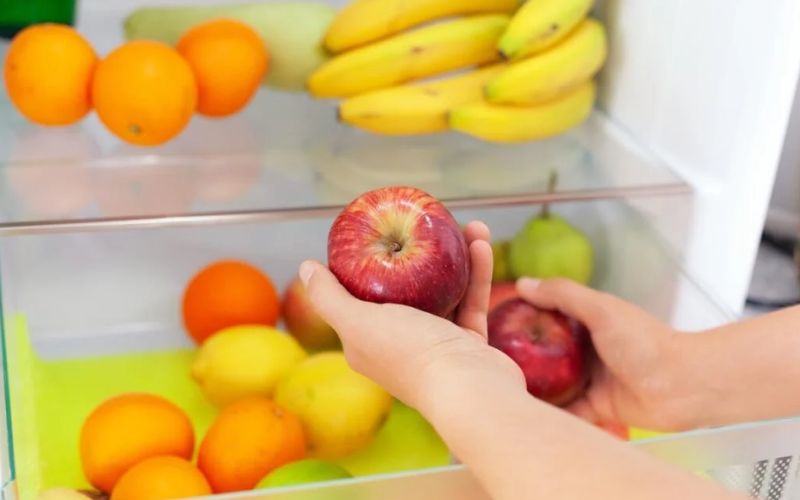
When stored in the refrigerator at the recommended temperature (around 32-40°F or 0-4°C), Fuji apples can last several weeks without losing their quality or flavor.
Should Fuji apples be refrigerated?
Apples, with their vibrant colors and delicious flavors, are a fruit that is known for its versatility and nutritional benefits. They are less assuming than other fruits, but don’t let that fool you – they have much to offer.
When it comes to apples, refrigeration is the way to go. App tends to keep longest when stored at temperatures between 31-36 degrees Fahrenheit.
So, if you want to maximize their shelf life and maintain crispness, it’s essential to keep them the coolest part of your refrigerator.
Doing so can ensure that your apples stay fresh and ready to enjoy whenever you’re in the mood for a healthy snack or a tasty addition to your favorite recipes.
How long do Fuji apples last unrefrigerated?
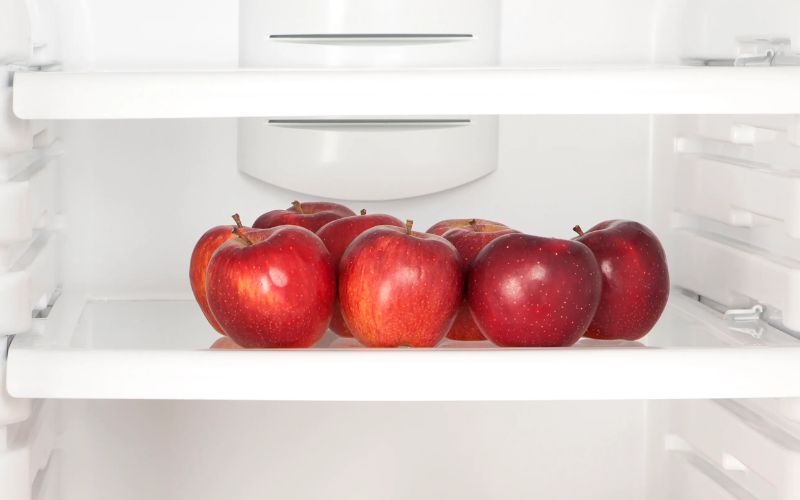
Apples can be stored at room temperature for approximately 5 to 7 days, but keeping them for extended periods may cause them to wither and lose their flavor and crispness. To prolong the shelf life of apples, it is recommended to refrigerate them in a plastic bag.
Where do you store Fuji apples?
If you want to extend the shelf life of your apples, Wortz and Scheck, two experts in the field, agree that the crisper drawer of your refrigerator is an excellent and highly recommended place to store them.
According to Wortz, apples can last an impressive six to eight weeks when stored in a fridge, significantly longer than other storage methods.
This longer lifespan can be attributed to the excellent and controlled environment provided by the refrigerator, which helps to slow down the natural ripening process and preserve the freshness of the apples.
So, if you want to enjoy crisp and delicious apples for an extended time, don’t hesitate to take advantage of your refrigerator’s crisper drawer – your taste buds will thank you!
Can you freeze Fuji apples?
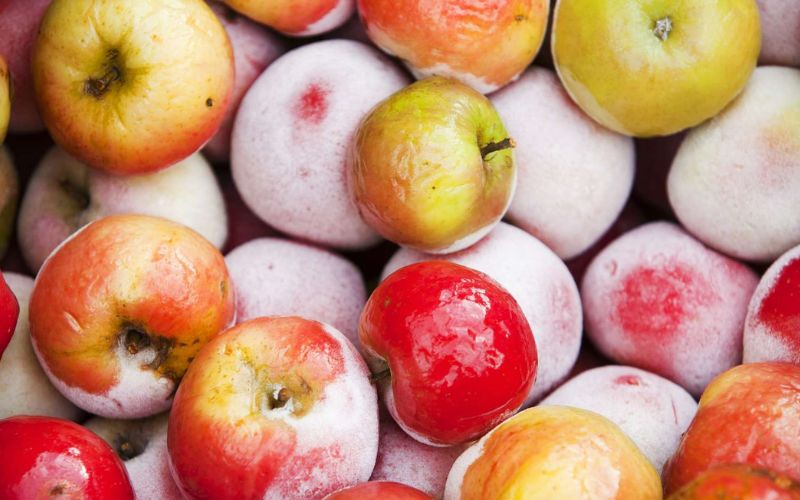
When it comes to freezing apples, it’s worth noting that sweeter varieties like Fujis or Galas retain their delightful flavor more effectively than their tart counterparts.
However, you can freeze any apple for six to nine months without issues. It’s important to remember that freezing an apple changes its texture. As a result, the flesh may become slightly spongier when compared to the crispness of a freshly picked apple.
Conclusion
Fuji apples are beloved for their sweetness, crispness, and vibrant color. Whether enjoyed fresh or used in various culinary creations, these apples offer a delightful eating experience.
By understanding their origin, taste profile, and storage tips, you can fully appreciate the unique qualities of Fuji apples and incorporate them into your favorite recipes or enjoy them as a healthy snack option.

